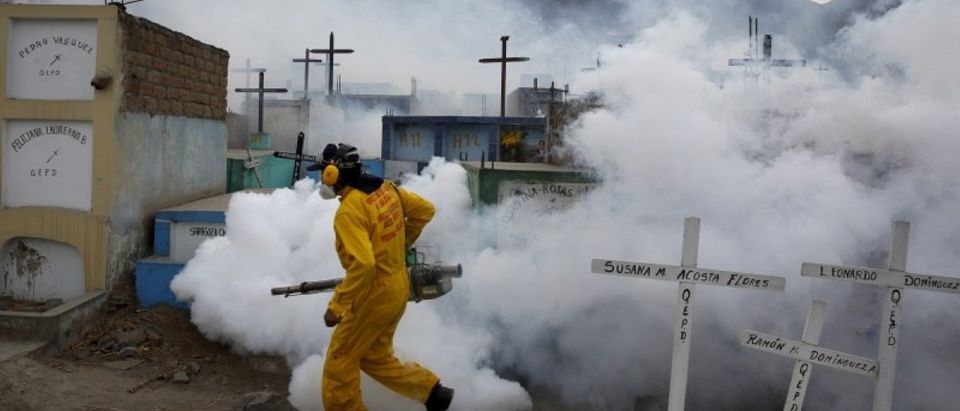As the Zika virus infects thousands across Latin America, a chorus of policy experts have called for bringing back a long-banned chemical spray largely responsible for eradicating malaria around the world.
“Perhaps there is one legitimate solution: DDT,” wrote Dr. Gilbert Ross Tuesday, the senior director of medicine and public health at the American Council on Science and Health. “While it is not perfect (some resistance to the chemical may have emerged in the past), it may represent the best chance to hold this epidemic at least partly in check.”
DDT, or dichlorodiphenyltrichloroethane, played a key role in eradicating malaria around the world because it was so effective at killing off disease-spreading mosquitoes. But the chemical was banned in the 1970s after environmentalists successfully convinced public health officials it was detrimental to birds and humans — despite a lack of evidence showing it was causing cancer.
“The green movement decided, decades ago, that the lives of sub-Saharan African did not matter as much as eggshell thinning, and millions subsequently died from malaria,” Ross wrote. “Now is the time for all to agree that the enviro-antipathy to DDT is baseless, and that if the impending Zika catastrophe is to be prevented in time, we need to use it.”
Environmentalist Rachel Carson’s 1962 book “Silent Spring” claimed DDT was harming bird populations. The book set off an environmental movement that culminated in the Environmental Protection Agency (EPA) banning the spray in 1972. By 2001, DDT was banned by the international community.
Banning malaria may have been a victory for environmentalists, but it was detrimental to poor people living in tropical countries.
“This was a big win for the mosquitoes, but a big loss for people who lived in Latin America, Asia, and Africa,” wrote Diana Furchtgott-Roth, a senior fellow at the conservative Manhattan Institute.
“Carson’s concerns and the EPA action halted the program in its tracks, and malaria deaths started to rise again, reaching 600,000 in 1970, 900,000 in 1990 and over 1,000,000 in 1997—back to pre-DDT levels,” she wrote.
While malaria dwarfs Zika as a public health concern, officials want to stymie its spread and met Monday to discuss ways to counter the virus. The World Health Organization (WHO) has declared a global emergency as the virus spreads across Latin America.
Zika is being spread by mosquitos, and is mainly dangerous to pregnant women who, when infected, have an increased risk of their child being born with microcephaly — when a baby is born with a small, misshapen head and have underdeveloped brains.
What makes Zika particularly hard to eradicate is it’s spread via the mosquito Aedes aegypti, which tends to live in crowded areas and bites people during the day. This means traditional methods of fighting mosquitos, like using nets at night, don’t cut it.
“There is no vaccine, nor treatment, for Zika and it is likely to take at least a decade to find one,” wrote Ross, bolstering his argument that DDT could help fight Zika.
But not all public health experts are convinced DDT is the solution to fighting Zika’s spread. One concern is that the mosquitos carrying the virus are still highly resistant to DDT chemical spraying.
“The widespread resistance to DDT today [among mosquitoes] means it wouldn’t work,” Joseph Conlon, spokesman for the American Mosquito Control Association, told the news site STAT. “For that reason, people need to understand that chemical sprays are not the answer to Aedes aegypti.”
Though the campaign against Zika will likely resemble a “military-style” campaign, according to one expert, going from house to house, spraying and educating people about mosquito eradication.
“You’re probably going to have to look at a military-style campaign of house-to-house [chemical] spraying,” Dr. Peter Hotez, dean of the National School of Tropical Medicine at Baylor College of Medicine, told STAT.
“We should implement what was successful then,” Hotez said, referring to the mosquito-control methods that “eradicated Aedes in several Latin American and Caribbean countries from 1947 to 1962.”
Hotez didn’t specifically call for the use of DDT, but Lawrence Gostin, an expert in global health law at Georgetown University did call for using the chemical again.
“People who aren’t conversant with the science think of DDT as a silver bullet that was taken away from them,” Gostin told STAT. “They don’t realize that, for Zika, it’s not a viable alternative to pesticides now in use.”
Some worry the biggest resistance to bringing back DDT could be the very groups that got it banned in the first place: environmentalists.
“As history shows, to the leaders the Green movement, black lives don’t matter,” wrote Robert Zubrin, an author and the president of Pioneer Energy. “They have chosen to allow millions of the world’s poorest to continue to suffer and die from malaria, and they are doing everything they can to stop the elimination of vitamin-deficiency diseases by genetically enhanced foods.”
“So long as Zika remains mostly limited to its current tropical haunts, the heartless hypocrites will doubtless maintain that while they too are deeply troubled by seeing babies born with missing brain parts, concerns over eggshell thickness must take priority,” Zubrin wrote. “Like the revelers in Poe’s Masque of the Red Death, they will continue to party in their comfortable quarters, secure in the belief that plague outside the mansion walls will never come for them.”
Follow Michael on Facebook and Twitter
All content created by the Daily Caller News Foundation, an independent and nonpartisan newswire service, is available without charge to any legitimate news publisher that can provide a large audience. All republished articles must include our logo, our reporter’s byline and their DCNF affiliation. For any questions about our guidelines or partnering with us, please contact licensing@dailycallernewsfoundation.org.












